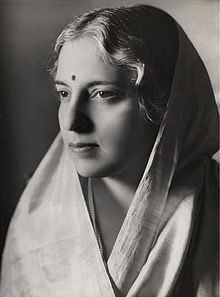
Back فيجايا لاكشمي بانديت Arabic فيجايا لاكشمى بانديت ARZ বিজয়লক্ষ্মী পণ্ডিত Assamese विजयलक्ष्मी पंडित Bihari বিজয়লক্ষ্মী পণ্ডিত Bengali/Bangla Vijaya Lakshmi Pandit Catalan Vijaya Lakshmi Pandit German Βιτζάγια Λάκσμι Παντίτ Greek Vijaya Lakshmi Pandit Esperanto Vijaya Lakshmi Pandit Spanish
Vijaya Lakshmi Pandit | |
|---|---|
 Pandit in 1938 | |
| 8th President of the United Nations General Assembly | |
| In office 15 September 1953 – 21 September 1954[1] | |
| Preceded by | Lester B. Pearson |
| Succeeded by | Eelco N. van Kleffens |
| 3rd Governor of Maharashtra | |
| In office 28 November 1962 – 18 October 1964 | |
| Chief Minister | Marotrao Kannamwar P. K. Sawant (acting) Vasantrao Naik |
| Preceded by | P. Subbarayan |
| Succeeded by | P. V. Cherian |
| Member of Parliament, Lok Sabha | |
| In office 1964–1969 | |
| Preceded by | Jawaharlal Nehru |
| Succeeded by | Janeshwar Mishra |
| Constituency | Phulpur |
| Personal details | |
| Born | Swarup Nehru 18 August 1900 Allahabad, North West Provinces, British India (present day Prayagraj, Uttar Pradesh, India) |
| Died | 1 December 1990 (aged 90) Dehradun, Uttar Pradesh, India (present-day Uttarakhand) |
| Political party | Indian National Congress |
| Spouse | |
| Children | 3, including Nayantara Sahgal |
| Parent(s) | Pandit Motilal Nehru Swarup Rani Nehru |
| Relatives | See Nehru–Gandhi family |
| Signature | |
Vijaya Lakshmi Pandit (née Swarup Nehru;[2] 18 August 1900 – 1 December 1990) was an Indian freedom fighter, diplomat and politician. She served as the 8th President of the United Nations General Assembly from 1953 to 1954, the first woman appointed to this post. She was also the 3rd Governor of Maharashtra from 1962 to 1964. Noted for her participation in the Indian independence movement, she was jailed several times during the movement.
Hailing from the prominent Nehru-Gandhi political family, her brother Jawaharlal Nehru was the first Prime Minister of independent India, her niece Indira Gandhi was the first female Prime Minister of India and her grand-nephew Rajiv Gandhi was the sixth and youngest Prime Minister of India. She was sent to London as India's most important diplomat after serving as India's envoy to the Soviet Union, the United States and the United Nations. Her time in London offers insights into the wider context of changes in India–UK relations.[3]
- ^ "Presidents of the General Assembly | United Nations". Wayback Machine. Archived from the original on 11 October 2012. Retrieved 22 March 2012.
- ^ Cite error: The named reference
:0was invoked but never defined (see the help page). - ^ Rakesh Ankit, "Between Vanity and Sensitiveness: Indo–British Relations During Vijayalakshmi Pandit’s High-Commissioner (1954–61)." Contemporary British History 30.1 (2016): 20–39.
© MMXXIII Rich X Search. We shall prevail. All rights reserved. Rich X Search